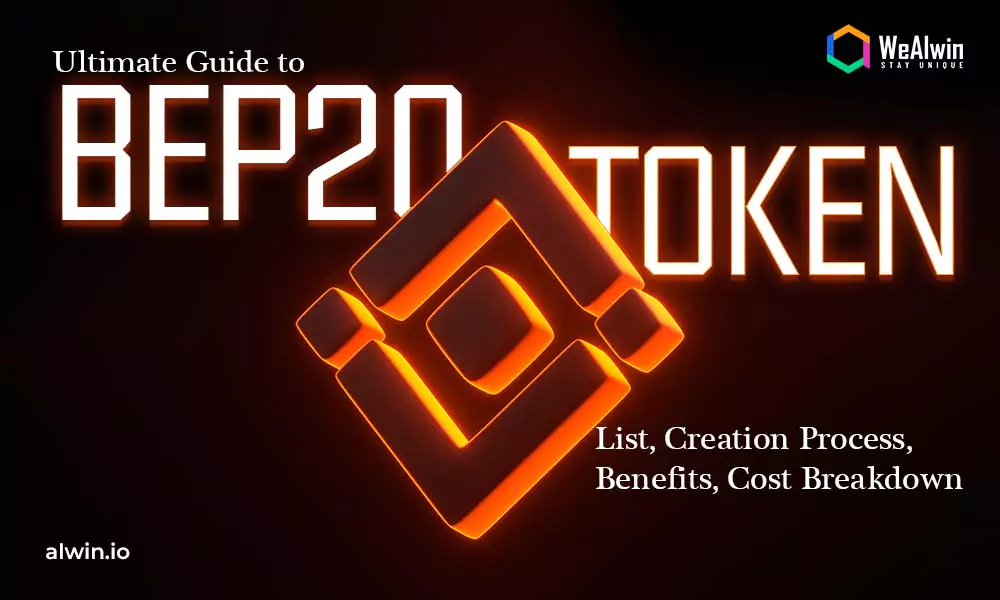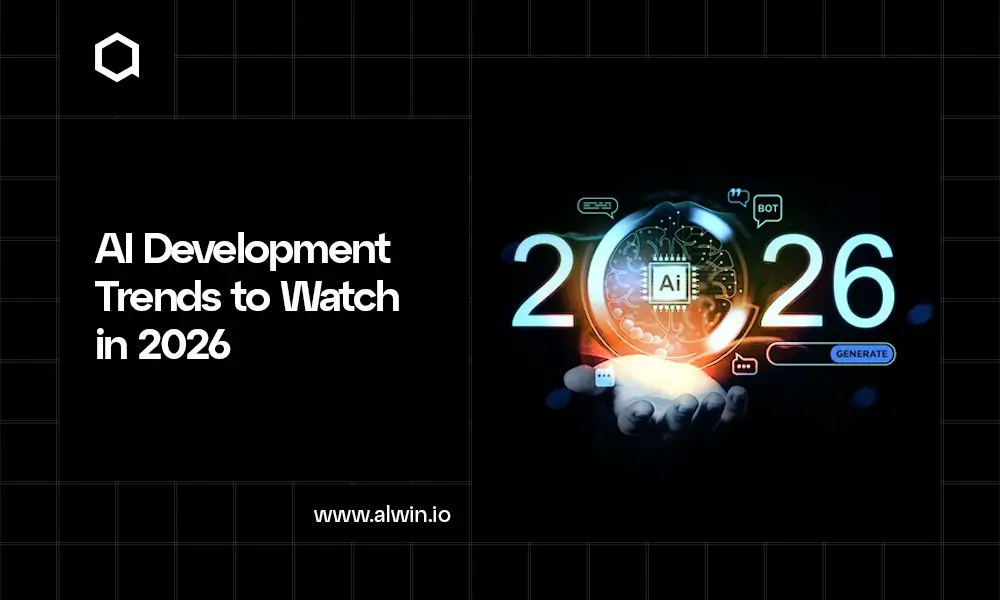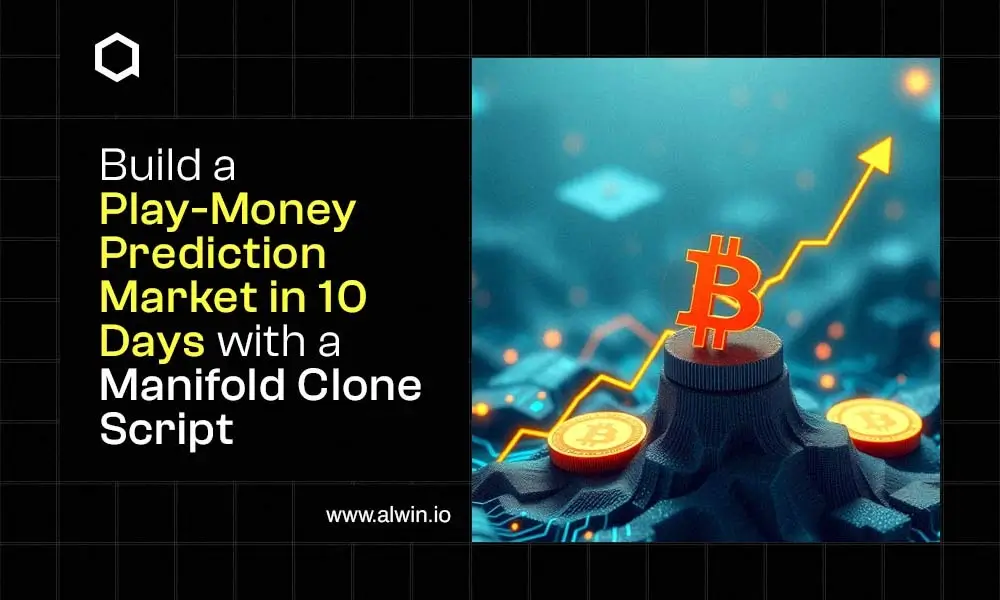Venturing into the world of blockchain and cryptocurrency, creating a BEP20 token on the Binance Smart Chain (BSC) opens pathways to innovation and decentralized solutions. Designed as an extension of the ERC20 standard on Ethereum, BEP20 tokens provide a versatile framework for developing digital assets, from stablecoins to utility tokens, leveraging BSC's robust infrastructure. This comprehensive guide explores the essential steps, considerations, and costs involved in BEP20 token development. Discover how WeAlwin Technologies can empower your project with expert guidance and customized solutions tailored to your blockchain ambitions.
What is a BEP20 Token?
BEP20 is a token standard on the BNB Smart Chain (BSC) that extends the widely used ERC20 standard from Ethereum. It serves as a template for creating tokens, outlining their spending rules and permissions. This similarity to both BNB Beacon Chain’s BEP20 and Ethereum’s ERC20 ensures compatibility across these platforms.
BEP20 standard was designed as a flexible specification for BNB Smart Chain, enabling developers to launch a wide range of tokens. These tokens can represent anything from company shares to stablecoins (assets backed by real-world currencies). Additionally, BEP20 tokens can be used to create native assets or peg tokens from other blockchains, facilitating their use on the BNB Smart Chain. "Peggy" coins, for instance, are BEP20 versions of assets like LINK or XRP.
BEP20 token transfers are powered by BNB, providing incentives for validators to process transactions by collecting BNB as fees.
BNB Smart Chain was developed to complement BNB Beacon Chain, featuring a dual-chain architecture. This setup allows BNB Smart Chain to handle decentralized applications without overloading the original chain, which is optimized for rapid trading. Emphasizing cross-chain compatibility, BEP2 tokens can be easily swapped for their BEP20 counterparts, often using the Binance Wallet extension.
How are BEP20 Tokens Used in Smart Contracts?
BEP20 tokens have versatile functionalities within smart contracts, enabling a wide range of applications:
Token Transfers: BEP20 tokens facilitate direct, decentralized transactions, allowing for seamless and secure value exchange on the BNB Smart Chain.
Token Burning: This functionality reduces the token supply, often used to increase scarcity and value, or as staking incentives in various blockchain applications.
Token Minting: BEP20 tokens can be generated anew for specific purposes, such as rewarding users, supporting platform growth, or launching new decentralized projects.
NFT Creation: BEP20 tokens support the creation of unique digital assets, enabling the development and trading of non-fungible tokens (NFTs) on the BNB Smart Chain.
DeFi and Gaming: BEP20 tokens are integrated into decentralized financial services and gaming applications, providing utility in lending, borrowing, yield farming, and in-game economies.
Characteristics of the BEP20 Token Standard
Understanding the key parameters of the BEP20 token standard is crucial for developers and investors:
Minting Capability: The "Can Mint" parameter determines whether additional tokens can be created, increasing the BEP20 token supply over time. This feature introduces inflationary tendencies, supporting various tokenomics strategies.
Burning Capability: Conversely, the "Can Burn" parameter allows tokens to be permanently removed from circulation, reducing the BEP20 token supply. This deflationary feature can enhance token scarcity and value.
Pause Functionality: The "Can Pause" parameter serves as a security measure, enabling the temporary suspension of all token-related activities. This feature is crucial in mitigating potential attacks or vulnerabilities within the platform, though it involves centralized control.
Address Blacklisting: The "Blacklist" parameter empowers the prohibition of malicious addresses within the token ecosystem. This measure helps protect against harmful actors and maintain the integrity of the token network.
BEP20 tokens offer robust capabilities that cater to various token management needs, from supply adjustments to security enhancements. As blockchain technology evolves, these features continue to support innovative applications across decentralized finance (DeFi) and beyond. Now is an opportune time for developers to explore creating their cryptocurrency tokens on the BNB chain, leveraging the flexibility and security of the BEP20 standard.
Benefits of BEP20 Tokens
BEP20 tokens offer several compelling advantages:
Standardization:
The BEP20 token standard provides a uniform framework for token creation on the Binance Smart Chain (BSC), ensuring compatibility and ease of integration across various applications and platforms.
Empowering Contracts:
These tokens enable the creation of programmable contracts, enhancing the functionality and automation of transactions within decentralized applications (dApps) and smart contracts.
dApp Advancements:
BEP20 tokens drive advancements in decentralized applications by facilitating seamless integration and enhancing user engagement through token incentives and utility.
Efficiency:
Transactions involving BEP20 tokens are executed efficiently on the Binance Smart Chain, benefiting from its high throughput and low latency, which contribute to a smooth user experience.
Interoperability:
BEP20 tokens are designed to be interoperable with other blockchain networks and token standards, promoting cross-chain compatibility and facilitating broader adoption within the blockchain ecosystem.
Cons of BEP20 Tokens
While BEP20 tokens offer significant advantages, they also present certain challenges:
Security Concerns:
Due to the decentralized nature of blockchain networks, vulnerabilities in smart contracts or platform infrastructure can expose BEP20 tokens to security risks such as hacking or exploitation.
Centralization Risks:
Features like pause functionality and address blacklisting, while enhancing security, can introduce centralized control over token management, potentially conflicting with the decentralized ethos of blockchain technology.
Interoperability Constraints:
Although designed for interoperability, BEP20 tokens may face challenges when interacting with tokens from other blockchain networks, limiting their utility in cross-chain applications.
Regulatory Challenges:
Regulatory frameworks around cryptocurrencies and tokens vary globally, posing compliance risks for projects utilizing BEP20 tokens, especially in jurisdictions with stringent regulatory requirements.
Evolving Ecosystem:
The blockchain ecosystem is rapidly evolving, introducing new technologies, standards, and market dynamics. This dynamic environment requires continuous adaptation and innovation to remain competitive and relevant.
Differences Between BEP20 and ERC20 Tokens
BEP20 Token is a native token standard for the Binance Smart Chain, while ERC-20 is the Ethereum equivalent. Both of these standards are designed to make the decentralized world more accessible, but they have their own unique functionalities and use cases.
BEP20 Tokens:
Native Standard: BEP20 is the token standard specifically designed for the Binance Smart Chain (BSC).
Functionality: It supports token creation and management within the BSC ecosystem, enabling transactions, smart contracts, and decentralized applications (dApps) on Binance's blockchain.
ERC20 Tokens:
Ethereum Equivalent: ERC20 is the token standard for the Ethereum blockchain, pioneering the tokenization of assets and enabling the creation of decentralized applications (dApps).
Functionality: ERC20 tokens facilitate peer-to-peer transactions, token swaps, and smart contract interactions on the Ethereum network, playing a fundamental role in the decentralized finance (DeFi) ecosystem.
Unique Functionalities and Use Cases:
BEP20:
Designed to integrate seamlessly with the Binance Smart Chain, BEP20 tokens benefit from BSC's high throughput and low transaction fees, making them suitable for applications requiring fast and cost-effective transactions within the Binance ecosystem.
ERC20:
Known for its robustness and widespread adoption within the Ethereum ecosystem, ERC20 tokens are favored for their compatibility with a wide range of decentralized applications (dApps), decentralized exchanges (DEXs), and token issuance platforms.
List of Top 10 BEP20 Tokens in 2024
Binance USD (BUSD):
A stablecoin pegged to the US dollar, facilitating stable value transfers on the Binance Smart Chain.
PancakeSwap (CAKE):
The native token of the PancakeSwap decentralized exchange (DEX), used for governance, staking, and liquidity provision.
Bakery Token (BAKE):
The governance token of BakerySwap, a decentralized automated market maker (AMM) and DEX on Binance Smart Chain.
SafeMoon (SAFEMOON):
Known for its unique tokenomics, including automatic LP acquisition and burn mechanisms, aiming to reward long-term holders.
Cream (CREAM):
The governance token of C.R.E.A.M. Finance, a decentralized lending platform supporting various assets on Binance Smart Chain.
TOKO Crypto Coin (TOKO):
The utility token of TOKO Crypto, used for transactions and incentives within their blockchain-powered e-commerce ecosystem.
WazirX (WRX):
The native utility token of WazirX, a prominent cryptocurrency exchange in India, facilitating trading discounts and platform rewards.
Trust Wallet Token (TWT):
The utility token of Trust Wallet, used for governance, staking, and accessing premium features within the Trust Wallet app.
Swipe (SXP):
The utility token of Swipe, a cryptocurrency wallet and debit card platform, offering rewards and discounts for token holders.
Alpha Token (ALPHA):
The governance and utility token of Alpha Finance Lab, supporting decentralized financial products and services on the Binance Smart Chain.
How to Create Binance Smart Chain BEP20 Tokens?
To create a BEP20 token on the Binance Smart Chain (BSC), the process generally involves the following steps:
Define Token Specifications:
Start by defining the purpose, name, symbol, and total supply of your BEP20 token.
Write the Smart Contract:
Develop the smart contract code that defines the token's functionality, including transfer mechanisms, balance checks, and any additional features specific to your token.
Testing:
Thoroughly test the smart contract to identify and fix any errors or vulnerabilities. Testing ensures that the token functions as intended and is secure.
Deployment:
Deploy the smart contract on the Binance Smart Chain. This involves broadcasting your contract to the blockchain, making it operational and accessible.
Distribution:
Once deployed, distribute your BEP20 tokens to investors or designated recipients as per your tokenomics and distribution strategy.
Maintenance and Monitoring:
Continuously monitor the smart contract to ensure its proper operation and security. Regular maintenance may include updates or enhancements based on feedback or changes in blockchain technology.
For a streamlined and secure development process consider consulting with us. we offer expertise in coding and security which can help tailor your token project to meet your specific business requirements and market goals.
How Much Does it Cost to Create a BEP20 Token?
The approximate cost to create a BEP20 token typically ranges from $5000 to $10,000, depending on the specific requirements and complexities involved in your project. However, it's important to note that this cost can vary based on several factors:
Feature Complexity: The complexity of the token's smart contract and its functionalities will impact development costs. Tokens with advanced features such as staking mechanisms, governance capabilities, or intricate tokenomics models may require more extensive development work.
Add-on Modules: Integrating additional modules or functionalities, such as token burning mechanisms, liquidity pools, or specialized governance protocols, can increase development costs.
Developer Team Size: The size and expertise of the development team involved in creating the BEP20 token can influence costs. Experienced teams or specialized blockchain developers may command higher rates but can also deliver higher-quality results.
Custom Requirements: Customizing the token's design, security features, and integration with other platforms or services can add to development costs. Tailoring the token to specific business needs may require additional development time and resources.
Market Conditions: Market conditions and demand for blockchain development services can also affect pricing. Prices may vary based on geographical location, prevailing industry rates, and the competitiveness of the development market.
To obtain an exact cost estimate for creating your BEP20 token, it's recommended to consult with our experienced blockchain consultants. They can provide a detailed breakdown based on your project's specific requirements and objectives, ensuring that the final product meets your expectations and business goals.
Create BEP20 Token with WeAlwin Technologies
When it comes to creating a BEP20 token on the Binance Smart Chain, WeAlwin Technologies stands out as your trusted Token Development Service Provider. With our expertise in blockchain development and extensive experience in token creation, we offer tailored solutions to bring your token project to life.
Contact WeAlwin Technologies today to discuss your BEP20 token project. Let us help you transform your token idea into a reality on the Binance Smart Chain, ensuring scalability, security, and success for your blockchain venture.



